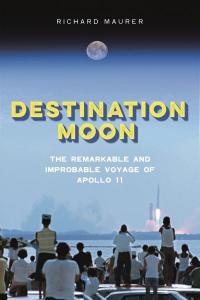
Richard Maurer: Destination Moon
For this column, NASW book editor Lynne Lamberg asks NASW authors to tell how they came up with the idea for their book, developed a proposal, found an agent and publisher, funded and conducted research, and put the book together. She also asks what they wish they had known before they began working on their book, what they might do differently the next time, and what tips they can offer aspiring authors. She then edits the A part of that Q&A to produce the author reports you see here.
Publication of NASW members’ reports in Advance Copy does not constitute NASW’s endorsement of their books. NASW welcomes your comments, and hopes this column stimulates productive discussions.
DESTINATION MOON
THE REMARKABLE AND IMPROBABLE VOYAGE OF APOLLO 11
Richard Maurer
Roaring Brook/Macmillan, June 11, 2019, $19.99
ISBN-10: 1626727457; ISBN-13: 978-1626727458
Maurer reports:
Quite by chance a few years ago, I came across my uncle’s letters to my aunt, written while he was in the infantry during World War II. It was news to me that he had been part of the invasion of southern France that took place two months after D-Day. Intrigued, I looked into the operation and was amazed to discover that it reminded me of nothing so much as Project Apollo—in speed, logistics, and the number of people involved. It got me thinking that Apollo drew on skills and attitudes developed during the national emergency of the war, a mere two decades before the Moon race.
“What a great idea for a book!” I thought. It wasn’t hard to come up with six key Apollo figures who had had formative experiences in World War II: Max Faget, chief spacecraft designer; Tom Paine, NASA administrator; Deke Slayton, head astronaut; General Sam Phillips, Apollo’s big boss; Wernher von Braun, architect of the Moon rocket; and Jim Webb, political genius behind Apollo. As a bonus, most of these men had faced dangers far surpassing those of astronauts riding rockets.
I toyed with incorporating this story into a traveling exhibit on Apollo that I was brainstorming with some friends. However, the idea sat on the back burner until 2016, when my old editor asked me what I was working on. I pitched the idea. He loved it and sent me a contract. No agent was involved.I’ve been working on Apollo projects since 1976, so research was a matter of digging deeper into ground that was already well spaded by my chronic Apollo obsession. Thanks to the Internet, I was able to do most of this from home by reading military records, NASA documents, newspaper and magazine accounts, and ordering books online and via interlibrary loan. I enjoyed every minute of it, but I must say I had forgotten the standard advice I give to aspiring authors: calculate the maximum amount of time the book can possibly take, then multiply that number by ten.
Contact info:
- Richard Maurer, 508 829-5505, rsmaurer@mac.com, https://www.nasw.org/users/rsmaurer/
- Book: https://us.macmillan.com/books/9781626727458
- Publicist: Madison Furr, 646 438-615, madison.furr@macmillan.com
NASW members: will your book be published soon? Take advantage of this opportunity for shameless self-promotion. Submit your report for Advance Copy.
Tell your fellow NASW members how you came up with the idea for your book, developed a proposal, found an agent and publisher, funded and conducted research, and put the book together. Include what you wish you had known before you began working on your book, or had done differently.
See https://www.nasw.org/advance-copy-submission-guidelines.
View Advance Copy archives at https://www.nasw.org/member-article/advance-copy.
Thinking of writing a book? If you are a NASW member, you may access a list of more than 150 books and online resources to help you craft your book proposal, find an agent and funding sources, negotiate your contract, learn about self-publishing, publicize and market your book, and more at https://www.nasw.org/article/write-book.
Send book info and questions about book publishing to Lynne Lamberg, NASW book editor, llamberg@nasw.org.
Advance Copy
The path from idea to book may take myriad routes. The Advance Copy column, started in 2000 by NASW volunteer book editor Lynne Lamberg, features NASW authors telling the stories behind their books. Authors are asked to report how they got their idea, honed it into a proposal, found an agent and a publisher, funded and conducted their research, and organized their writing process. They also are asked to share what they wish they’d known when they started or would do differently next time, and what advice they can offer aspiring authors. Lamberg edits the authors’ answers to produce the Advance Copy reports.
NASW members: Will your book be published soon? Visit www.nasw.org/advance-copy-submission-guidelines for information on submitting your report.
Publication of NASW author reports in Advance Copy does not constitute NASW's endorsement of any publication or the ideas, values, or material contained within or espoused by authors or their books. We hope this column stimulates productive discussions on important topics now and in the future as both science and societies progress. We welcome your discussion in the comments section below.


